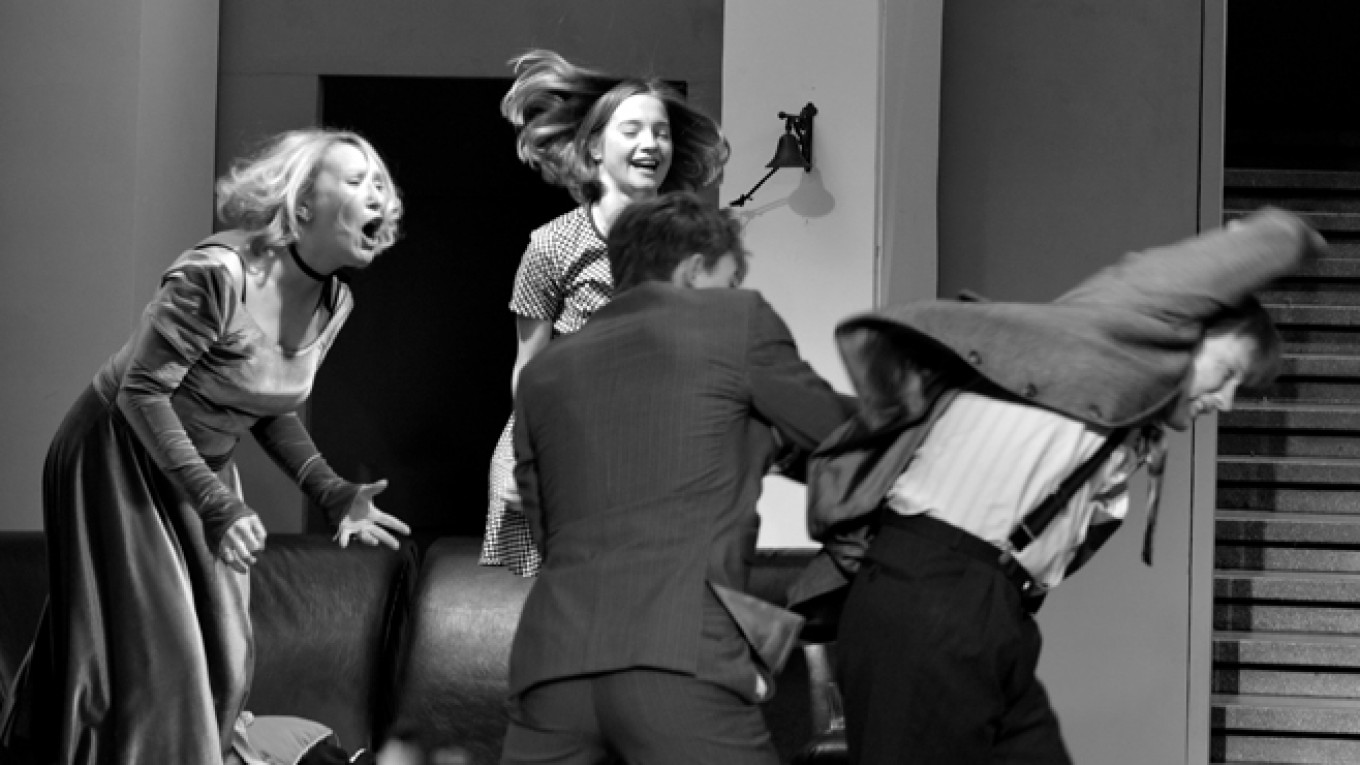Chances are if you know the art of Kama Ginkas you would not automatically think about Edward Albee. Just as you might be excused for not thinking about Ginkas when hearing the title "Who's Afraid of Virginia Woolf?"
And yet, Albee's most famous play has come together with Ginkas at the Moscow Theater Yunogo Zritelya to make for one of the most gripping evenings of theater this young season has offered us.
Imagine it is you and not some abstract young couple named Nick and Honey whom Albee's George and Martha invited for cocktails in the wee hours of the morning. Imagine what it must feel like to end up in between George and Martha when, fueled by whiskey, bad memories and evil intent, they begin slinging bitter insults and heavy projectiles at each other.
Actually, if you see this show, you won't have to imagine it. You will find yourself in the thick of it. You will share gazes and nods with the actors playing a husband and wife at war, and you will, like it or not, find that you are being tugged, first in one direction, then another. You'll be on her side; you'll be on his. You'll be on the side of the poor dupes Nick and Honey, to whom it didn't occur, as it should have, to go home when the opportunity presented itself.
Ginkas tells Albee's claustrophobic tale of two personalities who are way too big to inhabit a small, shared space by cramming us, the spectators, in there, too. Approximately 100 seats wrap around the perimeters of the theater's foyer, thus tightly embracing the small area that Ginkas designates as George and Martha's living room. Their sofa and easy chairs line up next to spectators' seats in such a way that when George wants to turn and roll his eyes to ridicule Martha, he will do so enlisting a neighboring audience member as his ally.
Working through his actors, Ginkas throws a long, unblinking gaze at Albee's bold deconstruction of the ties that do and do not bind human relationships.
But it goes much farther than that, too. This is something of an experiment in the nature of human interaction. For example, what is left if you toss out every last shade of the propriety and cultured politesse that usually govern relations, whether they be among lovers, casual friends or strangers?
George and Martha have been married "forever," as George puts it, for two decades perhaps. What began as a marriage of love became a war of attrition, with each partner brutally attacking the other's most vulnerable weaknesses. By bringing in two strangers not only to witness their wicked hostilities, but to become instruments in the struggle, George and Martha seem intent on discovering just how far an individual can ride the rail of cruelty and injustice before losing their human qualities.
But it seems that, as beastly as these two scholars of human behavior can be, they never entirely lose their humanity. Each spectator will have the opportunity to judge what that implies about humans and humanity.
Olga Demidova is utterly fearless in her portrayal of Martha, the privileged, now aging, daughter from a cultured family. She inhabits a psyche for whom way too far is not nearly enough. For her the notion of a social taboo is simply an invitation to shock and irritate in new territory.
But it takes two to tango, and Igor Gordin, playing Martha's younger husband George, is equally astute and duplicitous. He is a man exhausted beyond his age and consumed by his awareness that he is locked in a deadly confrontation he can never win. He does, however, take a certain poisonous pleasure in the battle itself. If nothing else it's a way to keep his mind from collapsing altogether.
Maria Lugovaya's Honey is deliciously innocent and resilient, while Sergei Belov plays her husband Nick as a relatively sophisticated man who just may resemble George and Martha in a decade or two.
There is a ton of humor in this theatrically condensed war of the sexes. But the blows thrown and taken land so hard and so often, one may often wince when laughing.
"Who's Afraid of Virginia Woolf?" (Kto Boitsya Virdzhinii Vulf?) plays Sunday, Wednesday and Dec. 27 at 7 p.m. at the Theater Yunogo Zritelya, located at 10 Mamonovsky Pereulok. 495-699-4995, moscowtyz.ru. Running time: 2 hours, 50 minutes.
Contact the author at artsreporter@imedia.ru
A Message from The Moscow Times:
Dear readers,
We are facing unprecedented challenges. Russia's Prosecutor General's Office has designated The Moscow Times as an "undesirable" organization, criminalizing our work and putting our staff at risk of prosecution. This follows our earlier unjust labeling as a "foreign agent."
These actions are direct attempts to silence independent journalism in Russia. The authorities claim our work "discredits the decisions of the Russian leadership." We see things differently: we strive to provide accurate, unbiased reporting on Russia.
We, the journalists of The Moscow Times, refuse to be silenced. But to continue our work, we need your help.
Your support, no matter how small, makes a world of difference. If you can, please support us monthly starting from just $2. It's quick to set up, and every contribution makes a significant impact.
By supporting The Moscow Times, you're defending open, independent journalism in the face of repression. Thank you for standing with us.
Remind me later.







